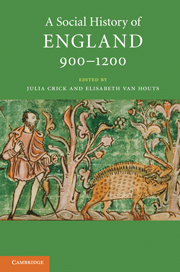Book contents
- Frontmatter
- Contents
- List of figures
- List of maps and tables
- List of contributors
- Acknowledgements
- List of abbreviations
- Map 1 England and its neighbours
- Map 2 England 900–1200
- I Introduction
- I.1 Land use and people
- I.2 Water and land
- I.3 Forest and upland
- I.4 Mineral resources
- I.5 Health and disease
- II.1 Authority and community
- II.2 Lordship and labour
- II.3 Order and justice
- II.4 War and violence
- II.5 Family, marriage, kinship
- II.6 Poor and powerless
- III.1 Towns and their hinterlands
- III.2 Commerce and markets
- III.3 Urban planning
- III.4 Urban populations and associations
- IV.1 Invasion and migration
- IV.2 Ethnicity and acculturation
- IV.3 Intermarriage
- IV.4 The Jews
- V.1 Religion and belief
- V.2 Rites of passage and pastoral care
- V.3 Saints and cults
- V.4 Public spectacle
- V.5 Textual communities (Latin)
- V.6 Textual communities (vernacular)
- VI.1 Learning and training
- VI.2 Information and its retrieval
- VI.3 Esoteric knowledge
- VI.4 Medical practice and theory
- VI.5 Subversion
- Glossary
- Time line 900–1200
- Further reading
- Index
- References
I - Introduction
Published online by Cambridge University Press: 05 June 2012
- Frontmatter
- Contents
- List of figures
- List of maps and tables
- List of contributors
- Acknowledgements
- List of abbreviations
- Map 1 England and its neighbours
- Map 2 England 900–1200
- I Introduction
- I.1 Land use and people
- I.2 Water and land
- I.3 Forest and upland
- I.4 Mineral resources
- I.5 Health and disease
- II.1 Authority and community
- II.2 Lordship and labour
- II.3 Order and justice
- II.4 War and violence
- II.5 Family, marriage, kinship
- II.6 Poor and powerless
- III.1 Towns and their hinterlands
- III.2 Commerce and markets
- III.3 Urban planning
- III.4 Urban populations and associations
- IV.1 Invasion and migration
- IV.2 Ethnicity and acculturation
- IV.3 Intermarriage
- IV.4 The Jews
- V.1 Religion and belief
- V.2 Rites of passage and pastoral care
- V.3 Saints and cults
- V.4 Public spectacle
- V.5 Textual communities (Latin)
- V.6 Textual communities (vernacular)
- VI.1 Learning and training
- VI.2 Information and its retrieval
- VI.3 Esoteric knowledge
- VI.4 Medical practice and theory
- VI.5 Subversion
- Glossary
- Time line 900–1200
- Further reading
- Index
- References
Summary
Master: What shall we say of the cook? Do we need his craft in any way?
The ‘Cook’ says: If you expel me from your society, you'll eat your vegetables raw and your meat uncooked; and you can't even have a good broth without my art.
Master: We don't care about your art; it isn't necessary to us, because we can boil things that need boiling, and roast the things that need roasting, for ourselves.
The ‘Cook’ says: However, if you drive me out so as to do that, then you'll all be servants, and none of you will be lord. And without my craft you'll still not be able to eat.
So the Englishman, Ælfric of Eynsham (c. 950–c. 1010), writing a thousand years ago, exposed a basic truth. Lords cannot maintain their status unaided, even for a day. Without subordinates to prepare food ‘you'll all be servants, and none of you will be lord’ and without skilled labour ‘you'll still not be able to eat’. Lordship, kingship, the actions of the elite, many of the facets of human behaviour captured in our historical sources, beg a multitude of questions, not least about what sustained them. These are questions usually tangential to the concerns of the writers who composed narratives and drafted documents in the tenth, eleventh and twelfth centuries, to the extent that when we encounter exceptions, most famously Domesday Book, historians have difficulty distinguishing the novel from the normal.
- Type
- Chapter
- Information
- A Social History of England, 900–1200 , pp. 1 - 14Publisher: Cambridge University PressPrint publication year: 2011



